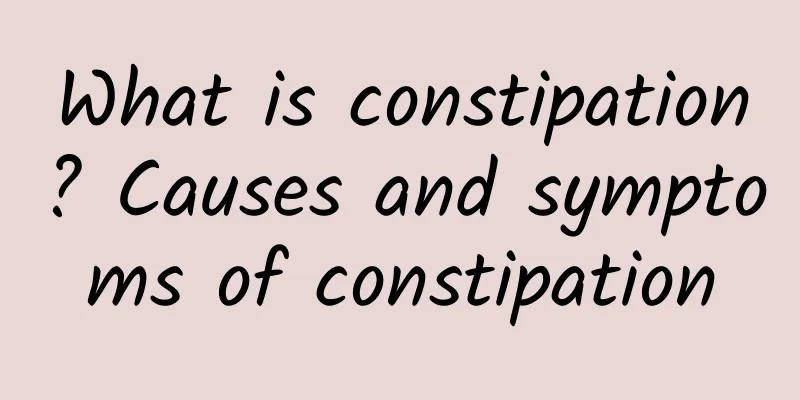What is constipation? Causes and symptoms of constipation

|
What exactly is constipation? I believe many people don't know what constipation really refers to. They only know that constipation is difficulty in defecation. In fact, constipation is a general term for a class of diseases, and different patients have different symptoms. Next, the editor will reveal the answer to you. What is constipation Constipation refers to the condition where the stool stays in the intestines for too long, resulting in less frequent bowel movements, dry stools, difficulty in passing stools, or incomplete bowel movements. Generally, no bowel movements for more than two days may indicate the presence of constipation. If you have bowel movements every day, but have difficulty in defecation and still feel like there is stool residue after defecation, or if you have abdominal distension, this should also be considered constipation. Many constipation patients defecate 1-3 times per week, and in severe cases, they defecate only once every 2-4 weeks. Some people defecate multiple times a day, but it is difficult to defecate, and each defecation time can be more than 30 minutes. The feces are as hard as sheep feces and the amount is very small. Symptoms of constipation The symptoms of constipation can be roughly divided into two categories: 1. Symptoms of functional constipation: This is constipation caused by the weakening of the function of the large intestine or rectum, or by always holding back the urge to defecate. It is generally painless, but the urge to defecate is weak, the interval between bowel movements is about 3 days, and it is difficult to defecate. It is also often accompanied by systemic symptoms such as abdominal distension, loss of appetite, dizziness, fatigue, palpitations, thick and greasy tongue coating, etc. 2. Symptoms of organic constipation: This is caused by a disease that causes the intestines to become narrow, or foreign bodies in the large intestine, making it difficult for stool to pass through the intestines. For example, constipation caused by tumors often changes the shape of stool and is often accompanied by purulent blood and mucus. Sudden constipation, abdominal pain, nausea, vomiting, intestinal obstruction and intussusception should be considered. If it is after abdominal surgery, intestinal adhesions should be considered. |
>>: Is a man’s sudden lower abdominal pain related to certain diseases?
Recommend
How to improve sperm quality through exercise?
Nowadays, environmental pollution is becoming mor...
Will blackhead masks cause enlarged pores?
In life, many people are called strawberry noses....
Causes of testicular pain
There are many common diseases in men. When it co...
Men feel dizzy, weak and limp
We must not be complacent when women feel dizzy, ...
What is the difference between febrile convulsions and epileptic convulsions?
Epilepsy"text-indent: 2em; text-align: left;&...
What medicine is used for penile herpes
Penile herpes can be easily confused with eczema....
What to eat for men with low sexual function
To build up men's masculinity, we need to und...
What is the best equipment for men to train their chest muscles?
Having strong chest muscles is something that man...
Can premature ejaculation be cured?
In normal sexual life, everyone's physical co...
Why does the testicle itch get worse the more you scratch it?
If your testicles often feel itchy, and the more ...
Is dumbbell side raise effective for training chest muscles?
More and more people like to use dumbbells to exe...
Characteristics of boys' sexual development age
Abnormal clinical symptoms of boys' reproduct...
Reasons for dark red semen
I believe that every male friend knows that the s...
What are the treatments for men's endocrine disorders?
Endocrine disorders are common diseases in women....
What are some natural ways to increase your penis size?
For every normal man, he hopes to have a satisfac...









